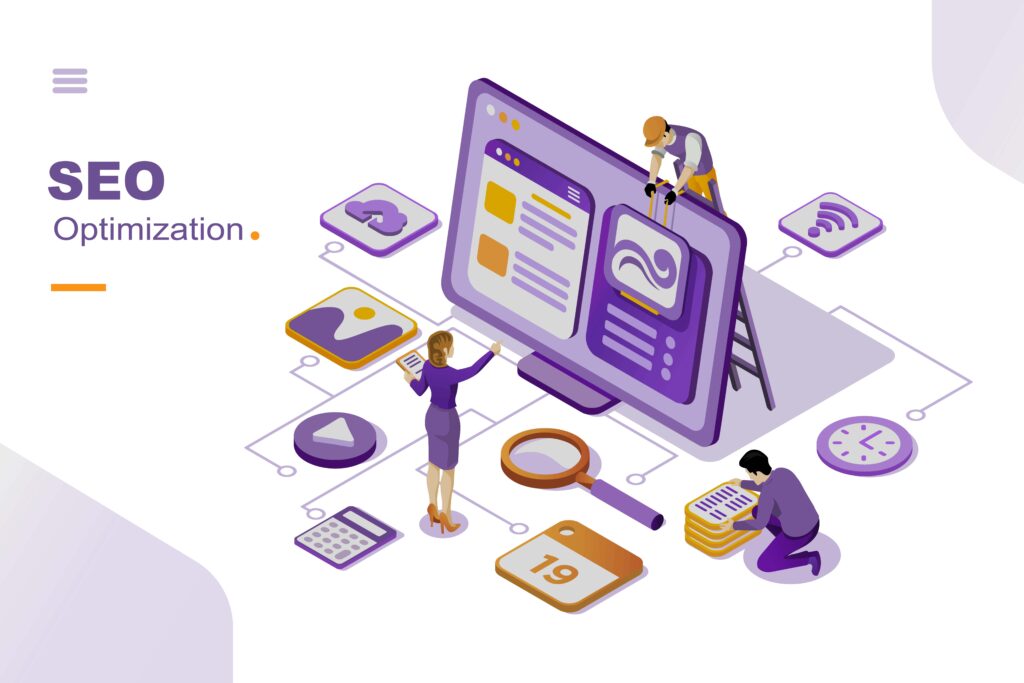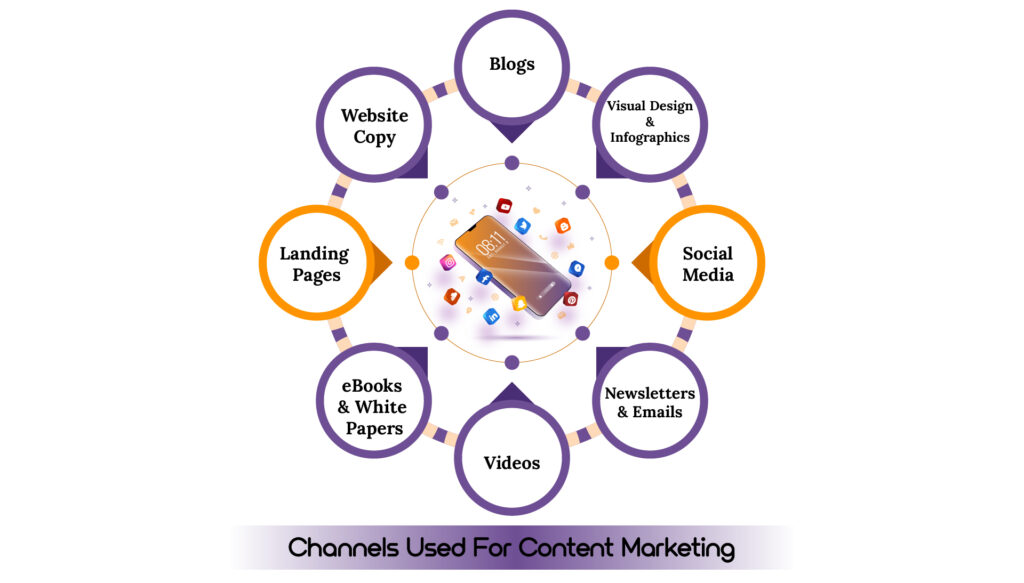
Importance of content marketing for your digital marketing strategy
In the world of digital marketing, content holds sway. It’s the heartbeat of every successful online strategy, driving engagement, sparking interest, and building connections.
Welcome to the realm of content marketing, where words, images, and videos come together to tell stories that captivate audiences. It’s the art of sharing information in a way that resonates, educates, and leaves a lasting impression.
Delve into the essential role of content marketing in crafting effective digital strategies. From boosting brand visibility to fostering meaningful relationships with customers, discover how content isn’t just a tool, it’s the foundation of successful online endeavors.
Let’s explore this further, beginning with a clear definition
- What is Content Marketing?

Content marketing is a strategic marketing approach focused on creating and distributing valuable, relevant, and consistent content to attract and engage a specific audience. This method aims not only to promote a brand but also to encourage the audience to actively engage with the brand’s online platforms and explore its offerings.
By employing storytelling and sharing informative or entertaining content, content marketing strives to elevate brand awareness and establish a meaningful connection with its audience.
The primary objective of content marketing is to inspire the audience to take desired actions, such as seeking more information, subscribing, or making a purchase. Unlike traditional marketing, the core principle here is to offer value to consumers, positioning the brand as a trustworthy source within its industry or niche.
Content marketing encompasses a wide range of content formats, including blog posts, white papers, eBooks, podcasts, digital videos, and more. By adopting this strategy, brands seek to build enduring relationships with their audience, fostering loyalty and credibility that can lead to sustained business growth and customer retention over time.
- Why is Content Marketing Important?

Content marketing acts as a foundation for your online presence, linking potential customers to your brand. It’s a crucial element for business growth. Let’s delve into why content holds such significant importance in the digital landscape.
⇒ Content Marketing Revolves Around Establishing Your Brand’s Credibility And Nurturing Relationships With Potential Customers
This happen primarily on your website, where you have full control over the content you create and share. Unlike social media platforms owned by large corporations (Twitter, Facebook, Instagram…), your website is your own space.
When you publish content on your website, it becomes your property—your content assets. However, on social media, anything you post isn’t technically yours. If a social media platform vanishes, your content disappears along with it.
Relying heavily on social media platforms is like building a house on rented land. Issues with your account or takedowns not only erase your content but sever your direct link to your audience.
Furthermore, social media platforms frequently alter their rules, affecting how content appears in user feeds. Your visibility there depends on the unpredictable nature of company decisions and algorithms.
This is why content marketing shines as a more reliable avenue for sustainable growth. It offers a secure foundation to establish your brand, ensuring control and consistency in engaging with your audience for enduring success.
⇒ Content Marketing Builds Trust With Your Audience In A Unique Way
When people engage with educational content from a brand that speaks directly to their needs and concerns, it creates a strong sense of trust. Content tailored specifically for a target audience helps to establish this trust by addressing their questions and problems.
What sets content marketing apart is its focus on providing help rather than just selling. By consistently offering valuable and personalized content, brands showcase not only their expertise but also their empathy.
Ultimately, this approach demonstrates to potential customers that you genuinely care about their issues and understand their perspective. The added benefit is that your brand not only understands their problems but also offers solutions through your products or services.
⇒ Content Helps You Rank In Search Engines For Better Visibility

Content marketing significantly enhances visibility on search engines, drawing in valuable leads with a high potential to become loyal customers for your brand.
These leads typically fall into two main categories:
- Those Already Familiar With Your Brand, aware of your expertise and offerings, and ready to make a purchase.
- Those Aware Of Their Problem, recognizing the solution they’re seeking, and actively searching for the best available option.
How Does Content Marketing Achieve This?
It capitalizes on targeted SEO (Search Engine Optimization). By strategically using keywords aligned with search intent in your content, it ensures that individuals looking for answers or solutions are directed towards your brand.
Different keyword types attract leads at various stages of their buyer’s journey:
- Awareness stage: Identifying a problem and seeking information.
- Consideration stage: Understanding the problem and seeking solutions.
- Decision stage: Evaluating solutions and prepared to make a choice.
The search terms people use provide valuable insights into their readiness to make a purchase. Those in the ‘decision’ stage are closer to buying than those in the ‘awareness’ stage.
How Does This Information Benefit Brands Using Content Marketing?
Consider a hotel targeting the keyword ‘stress-relieving destinations’ in a blog titled ‘5 Stress-Relieving Destinations to Ease Your Mind,’ featuring their city or town as an option.
If this blog ranks among the top Google search results for this keyword, the hotel would attract searchers at the consideration stage, seeking holiday getaways – precisely the audience needing the hotel’s solution.
These leads, highly qualified, could be nurtured through more content and captured using strategic calls-to-action, resulting in a significant win for the brand.
⇒ Content Enhances Your Search Engine Ranking, Leading To Increased Visibility Online
Consistently producing exceptional content greatly influences how search engines rank your website, enhancing its visibility online.
Websites enriched with premium content not only strengthen their resilience but also offer greater value, usefulness, and engagement to their audience—an aspect highly valued by search engines.
Securing a top position in search results is more than just gaining visibility; it’s about driving substantial traffic through search queries.
Recent data underscores the significance: the #1 organic (non-paid) position in Google boasts an impressive 39.6% click-through rate (CTR), while the #2 position maintains a CTR of 18.4%. Meanwhile, positions #9 and #10 at the bottom of the first page record a notably lower CTR of around 2%.
Paid search ads, often appearing above organic results, maintain a similar 2% CTR. Interestingly, users tend to favor organic results over these ads.
The highest organic results on Google draw more clicks and generate the most significant traffic. Crafting exceptional content through content marketing significantly contributes to achieving these prized top positions.
⇒ Content Marketing Provides Greater Returns On Investment Than Traditional Methods, Offering Cost Efficiency And Superior Outcomes

Content Marketing is a smarter investment compared to traditional marketing due to a couple of key factors:
- Cost-Effectiveness: Traditional marketing relies heavily on paid ads, which disappear when you stop paying. In contrast, content marketing’s main expense is creating content upfront. Once it’s out there, ongoing costs for visibility are low, especially if you use SEO.
- Enhanced Return on Investment (ROI): Content marketing shows better returns compared to traditional ads. Companies with active content like blogs attract more leads, get more website visitors, and appear more on Google.
Content marketing’s success comes from its lasting impact. As content gains attention, it keeps bringing in people, making leads, and boosting sales, proving its value over time.
⇒ Consumers Prefer Content Over Advertisements
Let’s face the truth: Content marketing has soared in popularity because it resonates deeply with what consumers want.
Their preference is evident: Before making buying decisions, many buyers engage with multiple content pieces. Moreover, a majority of them prefer absorbing articles about companies rather than being exposed to ads.
The surge in ad blockers is telling; More and more people are actively evading online ads, with millions actively employing blockers every month.
Marketing strategies must adapt because today’s consumers have distinct expectations, behaviors, and mindsets that heavily influence how they make purchases.
Presently, consumers prioritize research before committing to a purchase, actively seeking information about the best available options. They gravitate towards brands that align with their values and foster trust.
Content marketing perfectly meets these preferences by delivering content precisely when and where consumers are looking for it.
⇒ Your Competitors Are Using Content Marketing
Keep in mind, while you might not currently utilize content marketing, it’s highly probable that your competitors are deeply engaged in it.
The majority of businesses have embraced content marketing, and marketers are actively harnessing its potential. If your competitors effectively employ content marketing strategies, they:
- Establish a stronger online presence.
- Gain higher visibility in online searches.
- Attract a larger volume of leads.
- Forge deeper connections with their audience.
- Ultimately, they generate more conversions and sales.
Not having your website and content strategy aligned with this approach means missing out on a significant competitive edge.
⇒ Content Marketing Improves Your Website, Making It More Helpful And Optimized
Content marketing significantly improves your website, making it more valuable and well-optimized, particularly in terms of being helpful and search engine friendly.
Without content, your website would lack substance, resembling a store with an empty shopping cart—there wouldn’t be much to engage visitors or potential customers.
But when you add content through content marketing, your website transforms. It becomes a valuable resource, offering useful and intriguing information. Visitors will want to stick around because they’ll find content that’s relevant and helps them with their interests and issues.
As they keep coming back for more, their trust in your brand grows. They begin to rely on your expertise. Eventually, this trust can lead them to make purchases from you.
Furthermore, high-quality content is crucial for ranking well on search engines like Google. These platforms prioritize serving users with helpful content, making optimized content essential to increase your website’s value to these search engines.
⇒ It Turns Customers Into Loyal Fans
Content marketing is about building relationships through valuable, tailored content that addresses people’s needs. As they engage with this content, trust grows. Consistent content efforts create loyal customers who keep coming back, making it vital for long-term customer retention, even after they’ve made a purchase.
- 6 Steps To Create A Content Marketing Strategy:

To craft a structured content marketing strategy, businesses often follow these six essential steps:
- Choose a Content Management System (CMS): Select an appropriate CMS platform that suits your needs for efficient content creation, publication, and analysis on your website.
- Set Clear Goals: Define your objectives. Common goals include boosting brand awareness, fostering brand loyalty, educating the audience, and increasing customer engagement. A well-rounded strategy should aim to address these goals across various stages of the buyer’s journey.
- Understand Your Audience: Develop detailed buyer profiles. Identify obstacles your customers face and how your product or service can resolve these issues. Analyze demographics like age, gender, and location to tailor your content effectively.
- Generate Content Ideas: Spend ten minutes brainstorming content ideas. Sort them into categories of poor, okay, and excellent ideas. Then, refine the list to select the most relevant and promising concepts.
- Select the Right Channels: Determine the preferred communication channels of your target audience. Optimize content delivery by focusing on channels with the highest engagement levels. For instance, younger audiences might engage more on platforms like Instagram, while professionals may prefer comprehensive articles and data-driven content.
- Craft a Content Calendar: Organize your content within a schedule instead of a disorganized to-do list. A content calendar helps manage deadlines, track progress, and simplify planning. Consider optimizing existing content to kickstart your calendar effectively.
- What Content Can You Use In Your Content Marketing Strategy?

You have the flexibility to create and merge diverse content formats to align with your goals, financial resources, and your audience’s preferences. Let’s explore some of the most common content types that can be incorporated into your strategy:
- Videos: Videos provide easily digestible content, conveying extensive information compared to textual formats. Platforms like YouTube are ideal for sharing vlogs, webinars, tips, and how-to videos. These videos serve to educate and entertain your audience, and can be shared through emails, social media posts…
- Social Media Posts: In today’s social landscape, engaging your audience through these platforms is beneficial. Each social network serves distinct purposes, shaping your content creation to fit each platform’s goals.
- Blog Articles: Blogging offers a comprehensive platform to communicate ideas to your audience. Crafting detailed guides, instructions, or service comparisons demands time and effort. By understanding relevant keywords and incorporating them into your content, your articles stand a better chance of ranking higher on Google, attracting potential customers.
- Emails: This marketing channel boasts significant returns on investment (ROI). Leveraging emails enables lead nurturing, product promotion, event hosting, and updates for opted-in subscribers. Additionally, sending curated newsletters aids in keeping your audience informed about industry trends, indirectly promoting your business.
- Landing Pages: Landing pages play a crucial role in directing audience traffic and converting visitors into leads or customers. These focused pages highlight specific products, services, or offers, providing a targeted platform to encourage user actions such as sign-ups, purchases, or inquiries. You can create your landing page through the website www.gogetlead.shop to enhance your content marketing strategy.
Selecting the right content types for your strategy depends on your budget and objectives. It’s advisable to avoid tackling all channels simultaneously; a gradual, step-by-step approach allows for a more effective implementation and growth of your strategy.
- How to Analyze Your Content Marketing Strategy Success

Once your content marketing strategy is in motion, monitoring its performance becomes crucial. Here are a few ways to keep track:
- Track Social Engagement: Keep an eye on social media shares, comments, and reach to assess audience interaction and identify content preferences.
- Monitor Organic Traffic: Track visitors from non-paid channels like search engines to assess content resonance and visitor volumes. Tools like Google Analytics offer insights into traffic sources and popular content.
- Analyze Email Metrics: Review email performance metrics such as open rates, click-through rates, and conversions to understand campaign effectiveness and audience engagement.
- Utilize Google Analytics: Use this comprehensive tool to analyze website traffic, user behavior, and conversion rates, aiding decisions for content optimization and strategy adjustments.
Regularly observing these metrics helps refine your strategy, ensuring better results and heightened audience engagement.
- Content Marketing is The Present And Future of Marketing
Content marketing isn’t just the present; it’s the future of successful marketing strategies. It resonates with how consumers prefer to engage, fostering loyalty and boosting customer retention.
Its cost-effectiveness and sustainability surpass traditional methods, delivering increased leads and ROI. Furthermore, it’s the pathway to successful SEO and securing top Google positions, enhancing both user experience and search engine visibility.
By focusing on your website, content marketing establishes your authority in a digital landscape you own, rather than relying solely on rented social media platforms.
It’s a smart and invaluable approach for brand expansion that every business should incorporate into its overall strategy.
Quick Links
Support
©2023. Gogetlead. All Rights Reserved.

